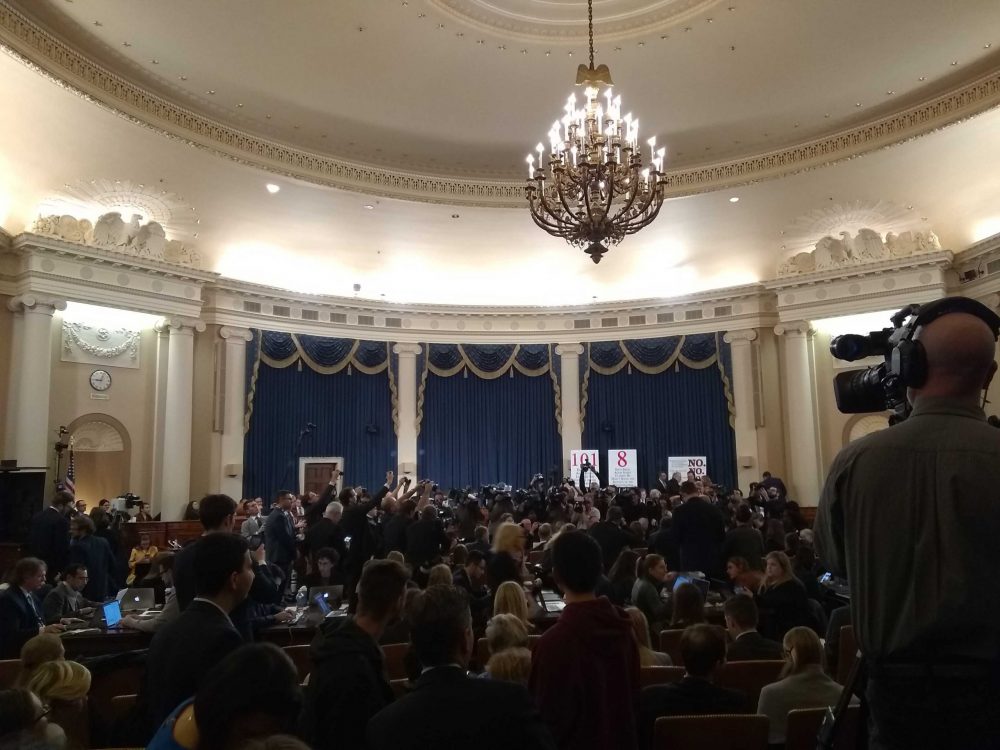WASHINGTON — After five full days of public hearings with 12 witnesses testifying in front of the House Intelligence Committee, Democrats are advancing to the next stage of the the impeachment inquiry into Republican President Donald Trump.
The inquiry was launched after an anonymous whistleblower alleged Trump pressured Ukrainian President Volodymyr Zelensky to investigate former Vice President Joe Biden and his son, Hunter Biden.
Joe Biden is a leading candidate for the Democratic nomination for president; Hunter Biden was a board member of Burisma, a Ukranian energy company.
Lawmakers learned that at the time of the alleged pressure, Trump had put a hold on about $400 million in military aid to Ukraine.
Here are the main takeaways from Capital News Service’s coverage in recent weeks.
Trump asked for a favor over the phone
In the first public hearing of the impeachment inquiry, acting U.S. Ambassador to Ukraine William Taylor revealed that his aide overheard Trump asking about “the investigations” in a July 26 phone call with U.S. Ambassador to the European Union Gordon Sondland.
The call between Trump and Sondland came one day after a call between the president and Zelensky, during which Trump asked for an investigation into Biden and alleged Ukrainian involvement in the 2016 election in exchange for military aid.
Army Lt. Col. Alexander Vindman, Jennifer Williams — who serves as the special adviser on Europe and Russia for Vice President Mike Pence — Ambassador Kurt Volker, former National Security Council Russia expert Fiona Hill and diplomat David Holmes also said they considered the call to be improper, agreeing with Taylor’s assessment.
Witness intimidation
As Marie Yovanovitch, the ousted U.S. ambassador to Ukraine, testified before the committee, Trump attacked her on Twitter.
Trump’s tweet read: “Everywhere Marie Yovanovitch went turned bad. She started off in Somalia, how did that go? Then fast forward to Ukraine, where the new Ukrainian President spoke unfavorably about her in my second phone call with him. It is a U.S. President’s absolute right to appoint ambassadors.”
In response to a question from House Intelligence Committee Chairman Adam Schiff, D-California, about the president’s tweet, Yovanovitch replied: “It’s very intimidating.”
Quid pro quo with everyone in the loop
Sondland, the U.S. ambassador to the European Union, said Trump and other top administration officials sought a quid pro quo with Ukraine.
“Everyone was in the loop. It was no secret,” Sondland said.
Sondland was the first witness in four days of House testimony to directly implicate Trump, Pence, White House Chief of Staff Mick Mulvaney, former National Security Adviser John Bolton and others.
Holmes, a political counselor at the U.S. Embassy in Kiev and aide to Taylor, testified that he overheard Trump on the phone with Sondland asking if Zelensky agreed to pursue the investigation into Biden and the 2016 election.
House Republicans keep trying to change the narrative
House Republicans have repeated similar talking points throughout the two-week span of impeachment hearings. They have pointed out that there’s no evidence Trump personally directed withholding military assistance to Ukraine, that Ukraine still got its military assistance and that Sondland testified Trump told him he wanted “no quid pro quo.”
After five full days of questioning, no House Republicans support impeaching the president. Rep. Will Hurd, R-Texas, who is retiring and was considered the most probable Republican to support impeachment, said he’s “not heard evidence the president committed bribery or extortion.”

